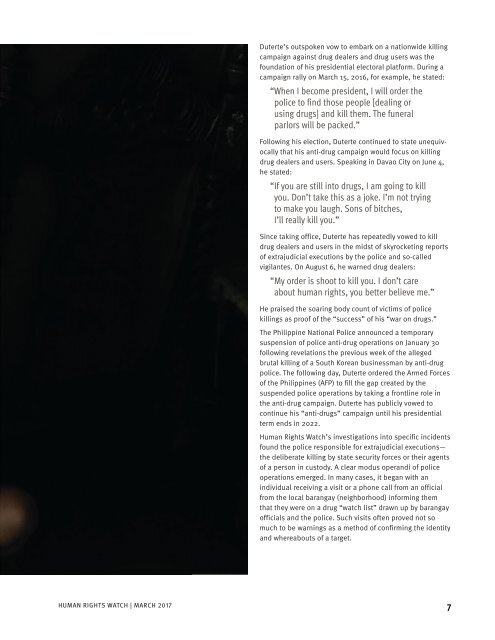“License to Kill”
nDPE309A46S
nDPE309A46S
You also want an ePaper? Increase the reach of your titles
YUMPU automatically turns print PDFs into web optimized ePapers that Google loves.
Duterte’s outspoken vow <strong>to</strong> embark on a nationwide killing<br />
campaign against drug dealers and drug users was the<br />
foundation of his presidential elec<strong>to</strong>ral platform. During a<br />
campaign rally on March 15, 2016, for example, he stated:<br />
“When I become president, I will order the<br />
police <strong>to</strong> find those people [dealing or<br />
using drugs] and kill them. The funeral<br />
parlors will be packed.”<br />
Following his election, Duterte continued <strong>to</strong> state unequivocally<br />
that his anti-drug campaign would focus on killing<br />
drug dealers and users. Speaking in Davao City on June 4,<br />
he stated:<br />
“If you are still in<strong>to</strong> drugs, I am going <strong>to</strong> kill<br />
you. Don’t take this as a joke. I’m not trying<br />
<strong>to</strong> make you laugh. Sons of bitches,<br />
I’ll really kill you.”<br />
Since taking office, Duterte has repeatedly vowed <strong>to</strong> kill<br />
drug dealers and users in the midst of skyrocketing reports<br />
of extrajudicial executions by the police and so-called<br />
vigilantes. On August 6, he warned drug dealers:<br />
“My order is shoot <strong>to</strong> kill you. I don’t care<br />
about human rights, you better believe me.”<br />
He praised the soaring body count of victims of police<br />
killings as proof of the “success” of his “war on drugs.”<br />
The Philippine National Police announced a temporary<br />
suspension of police anti-drug operations on January 30<br />
following revelations the previous week of the alleged<br />
brutal killing of a South Korean businessman by anti-drug<br />
police. The following day, Duterte ordered the Armed Forces<br />
of the Philippines (AFP) <strong>to</strong> fill the gap created by the<br />
suspended police operations by taking a frontline role in<br />
the anti-drug campaign. Duterte has publicly vowed <strong>to</strong><br />
continue his “anti-drugs” campaign until his presidential<br />
term ends in 2022.<br />
Human Rights Watch’s investigations in<strong>to</strong> specific incidents<br />
found the police responsible for extrajudicial executions—<br />
the deliberate killing by state security forces or their agents<br />
of a person in cus<strong>to</strong>dy. A clear modus operandi of police<br />
operations emerged. In many cases, it began with an<br />
individual receiving a visit or a phone call from an official<br />
from the local barangay (neighborhood) informing them<br />
that they were on a drug “watch list” drawn up by barangay<br />
officials and the police. Such visits often proved not so<br />
much <strong>to</strong> be warnings as a method of confirming the identity<br />
and whereabouts of a target.<br />
HUMAN RIGHTS WATCH | MARCH 2017 7


